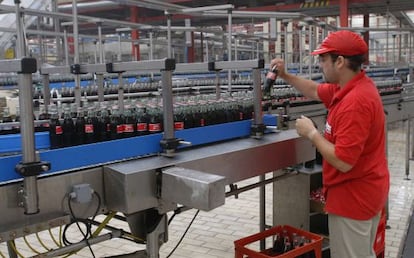Coca-Cola workers feel the pressure
Iberian Partners, the biggest bottler in Spain, will close plants and reduce its workforce under a new deal between family-owned businesses

Synergies. When workers at the seven bottling companies for Coca-Cola in Spain that are planning to merge heard that word they started to shake. This group of family-owned businesses, which up until now have been responsible for bottling the world's most popular soft drink in different regions of Spain, are preparing to join forces. The companies claim the reason for the tie-up is more "corporate" than "industrial." However, in the companies' plants and offices, workers are starting to think that there will be room for fewer workers in one large company than seven small-sized ones. These fears started to take on flesh two weeks ago, with 5,000 workers holding their breath at the prospect that the planned restructuring will show 1,200 of them the door.
Iberian Partners, the name of the merged company, issued a statement saying it had decided to "reorganize the company once the merger of the bottlers is complete," adding that this would include a series of measures that would affect 20 percent of the workforce. A company spokesman explained that not all of these measures would involve layoffs, and that Iberian Partners would seek to limit the number of job cuts to the minimum possible by relocating workers and through voluntary redundancies. Labor union representatives, who had met with the management to hear its plans, got the message loud and clear: the restructuring would take the form of a labor force adjustment plan (ERE) within the context of the new labor reforms introduced by the conservative Popular Party government in February of last year, which make sacking workers cheaper and easier. The reforms allow companies to cite so-called "objective causes," such as technological and organizational changes as well as falling sales, to lay off workers with the minimum severance pay of 20 days' wages for every year in service up to a maximum of one years' salary.
Iberian Partners is the product of seven family-owned companies with complex shareholder structures. Coca-Cola's bottling system in Spain had been a rara avis for decades. There were once more than 40 licenses for bottling its soft drinks. These joined forces to form seven companies. These were Cobega, owned by the Daurella family, which is the largest bottling company in Spain, with franchises that cover Catalonia and the Balearic Islands, and is also an investor in other bottlers. Casbega, the second biggest, is responsible for the center of the country. Rendelsur covers Andalusia and Extremadura, while Asturbega has the license for Asturias. Begano is the Coca-Cola bottler for Galicia and Norbega in the Basque Country and Navarre.
The companies say the tie-up is more "corporate" than "industrial"
This was too long a list for Atlanta, Georgia, the headquarters of the soft-drinks giant in the United States, and it was no surprise that the simplification of the bottling arrangement for its products in Spain went down well. The idea of a single license for Spain, Portugal and Andorra appealed.
The arrangements for the marriage of the seven companies, which were not easy to broker given their complex family shareholder structures, began in 2011, continued into 2012 and were completed on February 17 of this year, when the merger received the blessing of the National Competition Commission (CNC). As yet no profit-and-loss accounts or balance sheets for the new bottling giant have been released, but it is estimated to have annual net sales of around three billion euros. The new company serving Coca-Cola's Iberian operations accounts for 14 percent of the US giant's European sales, second only to Germany with 16 percent. It distributes 24 brands and 699 products to 400,000 clients, but it is a conglomerate patched together like Frankenstein's monster, each with its own plants, commercial, human resources and maintenance departments overlapping each other.
The first person to chair the board of directors of Iberian Partners is Sol Daurella of the family that owns Cobega. As her general manager she appointed Víctor Rufart, who has been tasked with carrying out the reorganization. To help him, he has hired the services of the law firm Sagardoy. The company insists that it has still not decided how it will go about the restructuring. But you can read a number of things between the lines in the statement it made. To start with, the company says it will "maintain and increase the production and workforces of seven of the existing 11 plants it owns." For which read four are to close. The statement goes on to say that there will be five main commercial centers in Spain, and that a large part of the current regional branch network created by the seven bottlers will remain in place. For which read that some of them will disappear.
Fewer plants. Fewer offices. And fewer jobs? "Solutions will be put forward that offer the possibility of internal relocation as well as formulas that favor the voluntary acceptance of the measures proposed, among which will be early retirement for those groups of workers who are eligible," Iberian Partners said in its statement.
They send the workforce letters saying we are a happy plant"
"The company hasn't given any details. But in the end, after the meeting in which they explained there would be a reorganization, they said that, yes, there would be an ERE," said José Vicente Canet of the Acción Sindical FEAGRA-CCOO labor union. He said the situation is uncertain and the workforce is nervous. Workers are starting to try and figure out which plants might be closed and where there will be overlapping jobs. According to the financial daily Cinco Días, the factories that will be shuttered will be in Asturias, Galicia, Andalusia and Mallorca. "Imagine what people are feeling in these areas, thinking perhaps it is true and they'll be out on the street," said Canet, predicting that negotiations on the ERE will be hard. The company denies it has already taken a decision on which plants will be closed and insists there will be no definitive plan for the overhaul until January.
But the workforce has already started to do its sums. Workers know that 1,200 people will be affected. They know that many plants are currently at 60 percent capacity. That means that if the plants where they work make the cut, they will take on the production and some of the workforce of other factories in order to reach capacity levels of close to 90 percent. However, it will be impossible to absorb all of the workers at the plants that close.
Hits on the website of the CCOO labor union at Casbega have shot up. "People are on edge," says one union member. CCOO has taken its concerns to the labor inspection department, complaining about the lack of information provided by the company. "They have been sending the workforce letters over months saying we are a happy plant and that we will all be on board the new project. But it's not true," complains the union member.
Labor unions expect the ERE to be presented sometime in the period January 15-30, meaning another month of anxiety about what their fate will be for the workforce. "The process has been initiated with absolute respect for the workers, with whom the company is committed to maintaining a permanent dialogue with a view to reaching an agreed solution," the management has promised.
Tu suscripción se está usando en otro dispositivo
¿Quieres añadir otro usuario a tu suscripción?
Si continúas leyendo en este dispositivo, no se podrá leer en el otro.
FlechaTu suscripción se está usando en otro dispositivo y solo puedes acceder a EL PAÍS desde un dispositivo a la vez.
Si quieres compartir tu cuenta, cambia tu suscripción a la modalidad Premium, así podrás añadir otro usuario. Cada uno accederá con su propia cuenta de email, lo que os permitirá personalizar vuestra experiencia en EL PAÍS.
¿Tienes una suscripción de empresa? Accede aquí para contratar más cuentas.
En el caso de no saber quién está usando tu cuenta, te recomendamos cambiar tu contraseña aquí.
Si decides continuar compartiendo tu cuenta, este mensaje se mostrará en tu dispositivo y en el de la otra persona que está usando tu cuenta de forma indefinida, afectando a tu experiencia de lectura. Puedes consultar aquí los términos y condiciones de la suscripción digital.









































